C.7 ROUNDTABLE Hidden Within Moments and Places, Memories as Trauma, Silence, and Trust: #MeToo
Fri Oct 16 / 9:00 – 10:30
voice_chat expiredchairs /
- Heather Leier, University of Calgary
- Nurgul Rodriguez, independent artist
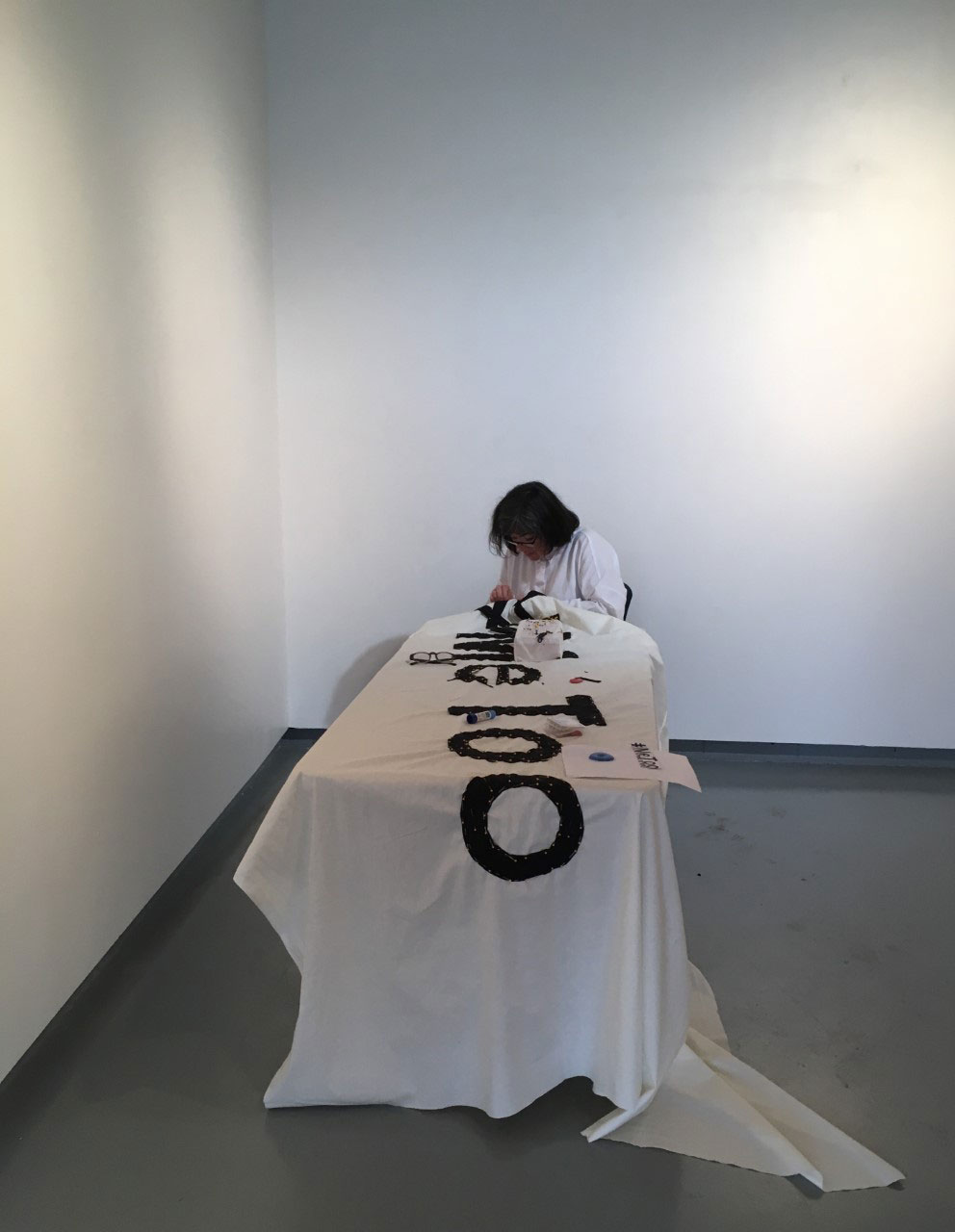
Nurgul Rodriguez, Noted memories by stitching, 2018. One week performance, performative, process-based and participatory art and exhibition initiated by nurgül rodriguez. Little Gallery, Department of Art, University of Calgary.
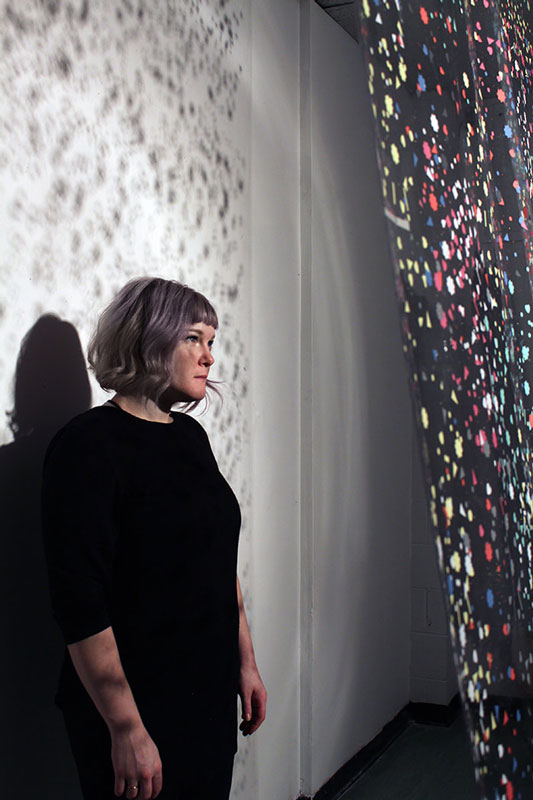
Heather Leier, She attempted to control the Uncontrollable, 2018, screenprint on vinyl, variable dimensions.
How are artists and cultural labourers embodying experiences of trauma within their creative endeavours? How can artists who are working from within various forms of academic and non-academic institutions prioritize the re-thinking and re-imagining of these spaces through gesture, performance, and care?
Centred within the institutional framework of the conference, the intention of this roundtable is to make a virtual space for these kinds of re-thinkings. Focusing on the inter-connectedness of patriarchal systems, institutional spaces and hierarchies, and feminist movements as related to traumatic experience, we invite proposals for presentations and/or performances that engage with objects, visual culture, and intervention. Each participant will have 5 to 20 minutes to engage with the virtual site and collaborate with the audience. This will be followed by an open discussion responding to the presentations/performances.
Heather Leier is an Assistant Professor in the Department of Art at the University of Calgary. She received an MFA from the University of Alberta and was the recipient of the Southern Graphics Council International Graduate Fellowship in 2016. Heather continually exhibits her work internationally and prioritizes contemporary print practice through her work as the Chair of Gallery Programming at Alberta Printmakers.
Nurgul Rodriguez del Ojo is an interdisciplinary artist. She works with clay, paper and other materials. Her work explores identity formation within a diasporic state of being. Nurgul settled in Calgary in 2009 after nomadic years living in Turkey, the United States and Spain with her family. She received a Visual Arts and New Media project grant from the Alberta Foundation for the Arts in 2018, holds an MFA from the University of Calgary, and recently completed residency programs at Medalta in Medicine Hat and at AUArts in Calgary.
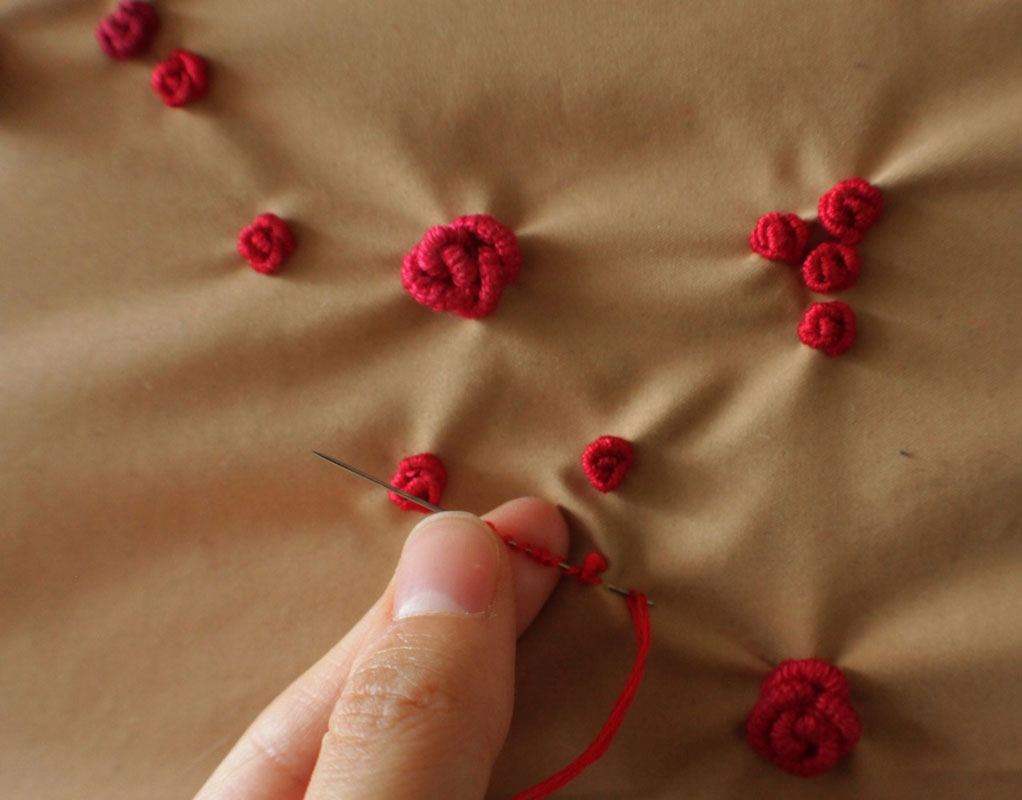
A Rose for Remembrance / Una Rosa para Recordar, Claudia Chagoya, 2020 58” x 71” Cotton thread embroidery on synthetic fabric. Piece embroidered until June 8, 2020.
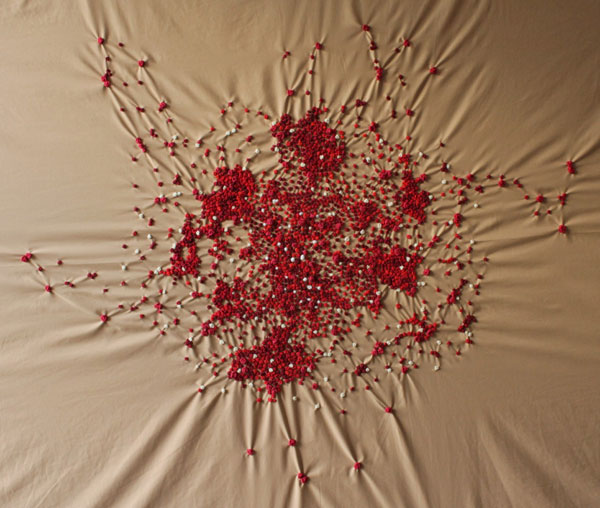
A Rose for Remembrance / Una Rosa para Recordar, Claudia Chagoya, 2020 58” x 71” Cotton thread embroidery on synthetic fabric. Piece embroidered until June 8, 2020.
C.7.1 A Rose for Remembrance
Claudia Chagoya, Visual Artist, SpanicArts: Hispanic Association of Professional Artists
The focus of this presentation is to address Feminicide, which is the killing of women because of their gender, where outrageous acts of violence are present. In Mexico, Feminicide manifests in thousands of women and girls murdered each year. The term also encompasses the imbalance of the gender power structures in Mexico, and the corruption and neglect from authorities surrounding these murders. This attitude of neglect deeply affects the ways victims are mourned and how families try to overcome these tragedies. In addition, these factors hinder the possibilities to openly mourn such complex deaths.
The disruption of grieving processes is part of the aftermath of Feminicide, and is the main focus of my current artistic practice. During this roundtable I will discuss the project A rose for remembrance / Una rosa para recordar, which is an artwork that I’m currently undertaking over the span of one year. Each day since October 2019, I have been embroidering 11 flowers a day, which represent the current statistics of feminicide in Mexico. October 13th this year, marks the end of this personal mourning ritual. The aim of the project is to present a visual indicator of the systematic and widespread violence that prevails in this country. Furthermore, this project commemorates all of our friends, sisters, daughters, and mothers, whose lives were tragically cut short. Through my art practice I aim to make feminicide visible and find ways to create a supportive community for the bereaved. This issue is present worldwide, and each country experiences it differently. Therefore, I find it important to address that mourning is a shared experience even though it is unique for each of us. Art, as a medium to address such difficult issues, can become a platform of social and political action.
Claudia Chagoya is a Mexican interdisciplinary artist based in Calgary, Canada. She holds an MFA degree from the University of Calgary, and a BFA from Instituto Allende in San Miguel de Allende, Mexico. Her artistic practice explores topics related to gender violence and her socio-political background, through the use of materials rooted in Mexican culture tied to various rituals such as: rebozos, salt, copal and sawdust. Chagoya is currently the president of SpanicArts, a Calgary non-profit organization that gives support, creates connections, and facilitates resources for Hispanic artists or people interested in Hispanic culture. Her work has been exhibited in Mexico and in Canada. Also, she has been an artist in Residence at the Royal College of Art in London, UK, the Women’s Centre of Calgary, and by the end of 2020, Chagoya will be part of the Calgary Allied Arts Foundation Residency Program at cSPACE King Edward.
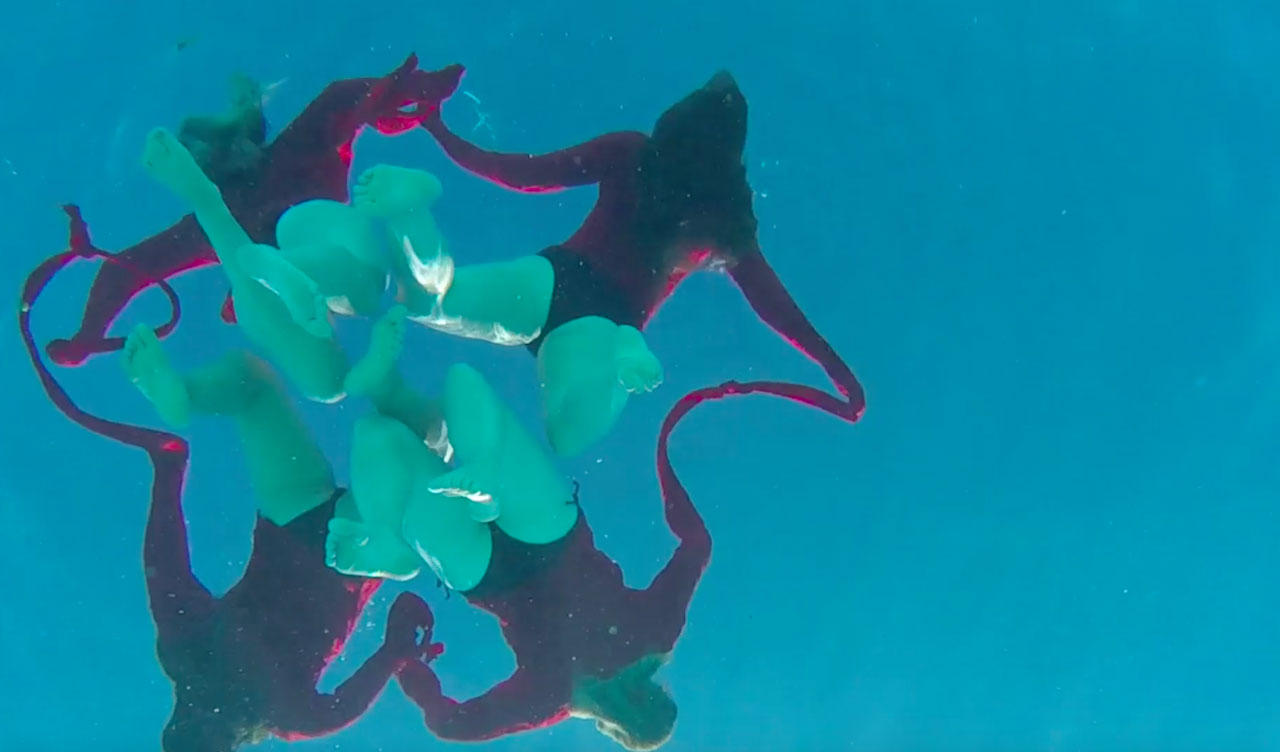
At Dawn, I Will Win video still, Becky Thera.
C.7.2 The Antidote: Solidarity, Empathy, and Art about Rape
Becky Thera, University of Alberta
“The solidarity of a group provides the strongest protection against terror and despair, and the strongest antidote to traumatic experience” Judith Herman, Trauma and Recovery, 1997
Embracing creative research and the format of an online roundtable, I will present an informal talk coupled with a video performance. Through this non-traditional presentation I will discuss the role of maternal feminist ethics of care when investigating personal trauma through art. In a patriarchal system of dominance that values certain voices over others, stories and art become particularly important in addressing traumatic experience and gender-based violence. My MFA thesis exhibition (completed in 2018) was centered around with my experience with rape. During the years it took to complete this exhibition I struggled to varying degrees with establishing my boundaries and coming to terms with widely sharing painful, personal experiences. This process taught me a lot about the role of affect within an academic community, societal perception of “acceptable” rape stories, and the re-traumatization that comes with exposure. Though there were struggles, my experience creating and displaying this exhibition was also accompanied with hope and support. The narratives I will share during this roundtable address the challenges, as well the hope that comes with exploring traumatic experience through art.
For my presentation I will speak informally while showing a performative video piece. This will involve a repetitive video from the exhibition I am discussing, depicting the slow movement of figures connected underwater. This video will couple the experience of traumatic vulnerability with the essential need for care within these discussions. Through the presentation I will consider potentials for vulnerability and care, frailty and failure, in a patriarchal space that traditionally de-values affect. I aim to present and talk through experiences, questions, struggles and successes to embody re-thinking and re-imagining academic art.
Becky Thera is an interdisciplinary artist living and working in Edmonton, Alberta. Thera completed her MFA in Art and Design at the University of Alberta in 2018. Her MFA research, which explored trauma in relation to personal, intergenerational and systemic gender-based violence, was awarded a SSHRC (CGS M) grant. Thera works in video, photography, embroidery, drawing, and performance. With an extensive history in synchronized swimming, Thera has been working as a coach and choreographer since 2007. This experience influences the involvement of performance and water in her artistic practice. Thera’s work explores themes of empathy, intimacy, and feminist politics, situating herself between poetry and activism. Thera’s work has been featured nationally and internationally, including notable exhibitions at Nuit Blanche Regina and Feminist Art Fest in Toronto, ON.
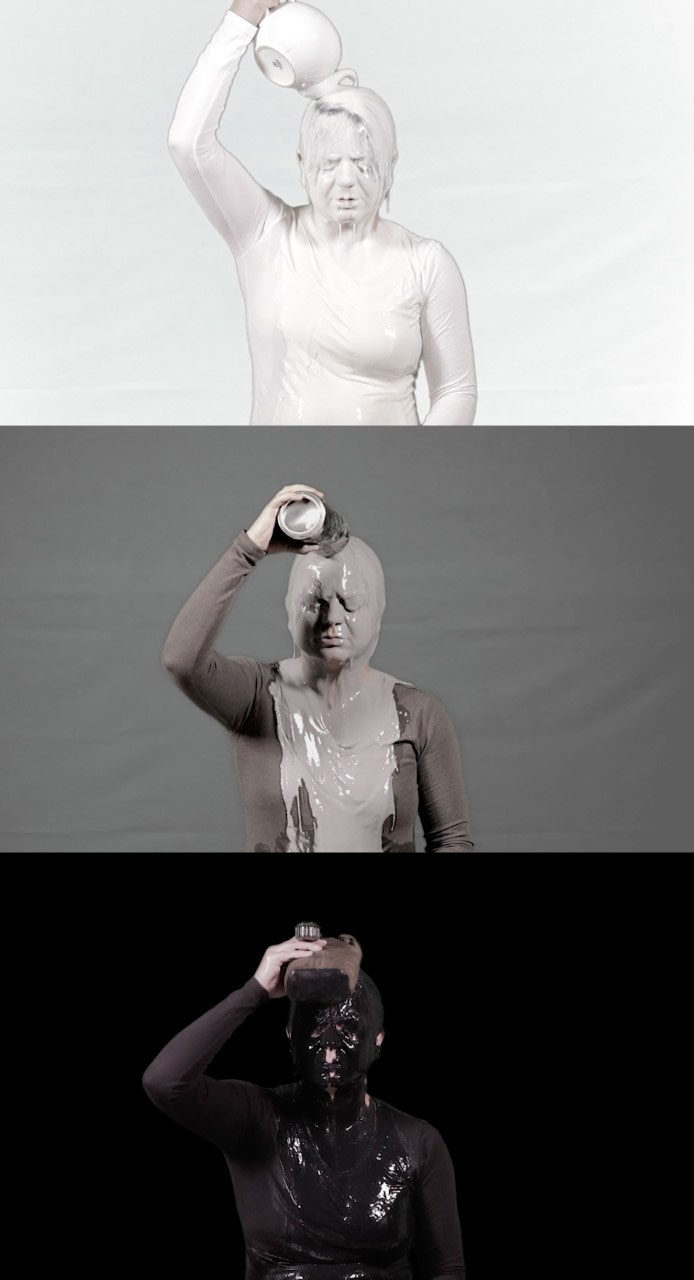
Sepideh Tajalizadeh Dashti, Counterpoint 1, Three Channel Video, 10 min, 2020
C.7.3 My Contingent Body
Sepideh Tajalizadeh Dashti, University of Western Ontario
The spaces I have inherited and now occupy have shaped my life in specific and concrete ways. As an Iranian woman who grew to adulthood in Iran and who now resides in Canada and the United States, I have experienced deep feelings of ambiguity with regards to experiencing different cultures and social expectations. Because my practice is body-centric, I seek to claim my body across multiple media of performance, video, and installation. I focus on the traumatized female body, representing it in abject or grotesque states, sometimes evoking an agonized or melancholic state of mind. I consider how my multicultural, individual body has derived its multiplicity from differences between the cultures of the West and Middle-East, as well as differences that exist within a single culture, particularly around gender and sexuality. These enduring feelings of ambiguity have both unsettled and politicized my daily life and helped to raise my consciousness about the oppressions I face as a woman. I have started to question where my particular experiences and practice fit within broader societal discourses and representations that contribute to making me who I am. In response, I seek to understand and investigate the construction of my identity as a woman as it has existed within traditional notions of family and conservative belief structures of both West and Middle-East. Juxtaposing this aspect of my female identity with an exploration of my cross-cultural identity, one that shifts between the contexts of Middle-Eastern and Western cultures. I find feminist poststructuralist thought provides a possibility for conceptualizing the in-between state that I have experienced intimately, as a place to begin. I explore my work with Rosi Braidotti’s theories of radical relationality and nomadic subjects and Amelia Jones’ theory of queer feminist durationality as forms of embodied subjectivity to produce affirmative representation in my practices.
Sepideh Tajalizadeh Dashti currently is in her second-year of MFA at Western University in London, Ontario, Canada. She migrated to Canada in 2011 from Iran and due to her family Commitment, she has lived to the USA since August 2019. Her artistic practice is related to exploring her body by creating performance, video, and installation. Her work also includes her reflection concerning the injustice and tyrannical politics of her homeland that she still engages with. Through multiple discourses and contexts, she is always rediscovering, reinventing, and reinterpreting her Iranian identity, as a pivotal point for exploring her work in the multiple and heterogeneous context. Dashti earned her BFA, Fine Arts Studio Practice-Intensive Studio Specialization, Digital Arts Communication Minor, at the University of Waterloo in Waterloo, Ontario, Canada with the Dean’s Honours List. She received the Joseph-Armand Bombardier Canada Graduate Scholarship in social sciences and humanities research in 2019.



